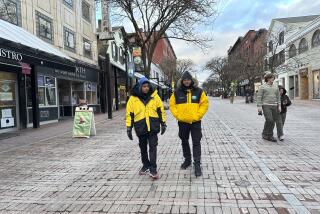Welsh Seek to Perpetuate Their Identity in Vermont
- Share via
POULTNEY, Vt. — As a child in an area of Vermont known for its slate quarries and the Welsh workers it attracted a century ago, Janice Edwards watched as her ancestors’ language and culture slipped away.
Now Edwards and others are working to restore the Welsh to their area. She has been studying the Welsh language at Middlebury College about six years and, from her home in Poultney, she runs the Welsh-American Genealogical Society and helps with the area St. David’s Society, of which she is a founder.
“Growing up here, it was not uncommon to hear Welsh spoken,” said Edwards, who says she’s conversant in the complex language. But as older residents passed on, so did their native language and their traditions.
“The ones who remember and the ones who actually traveled over here [in the 19th century] have passed away,” she said.
Vermont’s Welsh pioneers don’t get as much attention as some of their contemporaries do. Edwards said there are a few reasons for that. One is that Welsh people might be more modest than others.
“They tend not to be people who talk about themselves and their accomplishments,” she said.
For another, many Welsh people who moved to the United States were recorded as English because Wales is part of Britain. Edwards said that in the 1990 census, 7,000 people in Vermont identified themselves as being of Welsh heritage.
Also, Wales is a small country -- with a population of 3 million -- so its members make up a small proportion of the immigrants who settled in Vermont. And many people think of Wales as part of neighboring England, not as a region with its own identity that is part of Great Britain.
Still, there are a few signs of the Welsh culture that have survived in Poultney. One is an 1860 wooden church that Edwards said is the oldest Welsh church in New England. It’s now derelict -- services were last held there in 1945, and at one point after that, it housed cows -- but it is slowly being repaired by its owner.
Poultney also has one more recent and active Welsh chapel -- the Poultney Welsh Presbyterian Church -- where services are held every Sunday.
Then there are the Welsh names -- such as Jones, Davies, Edwards, Evans, Hughes, Williams and Pritchard -- on streets and buildings.
Poultney’s St. David’s Society -- named after the patron saint of Wales, a clergyman who founded a strict monastic order around 500 A.D. -- has counterparts in many other towns around the world.
The area’s Welsh community is one of the more significant in the United States, said Eirug Davies, an associate member of Harvard University’s Department of Celtic Languages and Literatures and a native of Wales.
Welsh immigrants often arrived in the United States with expertise in slate quarrying or coal mining.
The ones from the slate areas of Wales formed important communities in the “slate valley” formed by towns in Vermont and upstate New York, and a similar region in eastern Pennsylvania.
At its peak in the late 1800s, the Vermont-New York community had about a dozen Welsh language churches, Davies said. The Scranton, Pa., area had more than 50 Welsh-language churches during that period, he added. Other settlements in Ohio and Wisconsin had about 20 Welsh language churches, and there were also important settlements in Colorado. But the language and culture faded quickly as the new generations were raised in the United States.
“It’s a hard struggle, even in Wales, to keep a national identity, let alone here,” Davies noted. “Everything possible has been done to wipe out the culture over the years by the English government.”
Edwards publicizes her area’s Welsh heritage where she can, distributing a newsletter and connecting families all over the world with their Welsh ancestry through the genealogy society. She also keeps a list of famous Welshmen -- including George Jones, a co-founder and editor of the New York Times, said to have been born in Poultney.
In her search for other notables of Welsh ancestry, Edwards called veteran United Press International White House reporter Helen Thomas, who told her that she doesn’t have a Welsh background.
But she’s not discouraged. Someday, she would like to see Poultney schoolchildren learning about the Welsh language and culture.
Green Mountain College in Poultney has a Welsh heritage program that puts on a Welsh festival every fall, and sponsors Welsh concerts and other events. The college also has a 2,000-volume locally donated Welsh library of books and documents.
Elsewhere in the country, Welsh culture is going strong. Davies meets with Boston-area Welshmen once a month and gets plenty of chances to speak his native language. “The students here keep me talking Welsh all the time,” he said.
More to Read
Sign up for Essential California
The most important California stories and recommendations in your inbox every morning.
You may occasionally receive promotional content from the Los Angeles Times.










